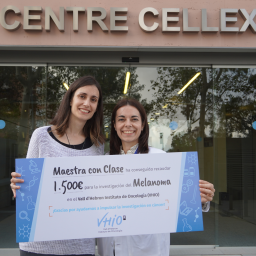
Initial data from the IGNYTE clinical trial demonstrate that the combination of the oncolytic virus RP1 and nivolumab (PD-1 immune checkpoint inhibitor) provides durable and clinically significant antitumour activity in patients with melanoma refractory to anti-PD1 immunotherapy.
The preliminary results of this study, in which Dr Eva Muñoz-Couselo, medical oncologist at Vall d’Hebron University Hospital and head of the Melanoma and Other Skin Tumours Group at VHIO, participated, are presented today at the American Society of Clinical Oncology Congress (ASCO).
“Patients with melanoma who undergo immune checkpoint inhibitor-based immunotherapy anti-PD-1 have limited treatment options, so we must explore new therapeutic strategies,” says Dr Eva Munoz-Couselo. “In this study, we demonstrate for the first time that the combination of oncolytic viral therapy and conventional immunotherapy could become a new standard of care for these patients who have not responded durably to previous immunotherapy.”
A genetically modified virus
RP1 is an immunotherapy based on the genetic modification of the herpes simplex virus HSV-1, which is injected into the tumour and selectively recognises tumour cells and activates the immune response against them.
Data from the first 75 patients who participated in the phase 1/2 IGNYTE trial evaluating the efficacy of the RP1 plus nivolumab combination are presented at ASCO. Inclusion criteria required patients to have locally advanced or metastatic melanoma and to have been previously treated with anti-PD1 immunotherapy.
The overall objective response rate was 37.4%, and 18.7% of patients achieved a complete response. “The response rates observed are very encouraging when evaluated according to previous anti-PD-1 therapy and the stage of the disease when receiving the experimental treatment,” adds Dr Muñoz-Couselo.
85.3% of the responses continued between 3.7 and 36.6 months from the start of treatment. Most treatment-related adverse events were grade 1 to 2, with the most common being fatigue, chills, pyrexia, and nausea.
“The preliminary results of this study are very promising for those patients with metastatic or advanced melanoma in whom immune checkpoint inhibitor-based immunotherapy as a first treatment strategy has not worked,” concludes the researcher.
References
2024 ASCO Annual Meeting
Track: Melanoma/Skin Cancers
Type: Rapid Oral Abstract Session
Efficacy and safety of RP1 combined with nivolumab in patients with anti–PD-1–failed melanoma from the IGNYTE clinical trial.
Michael Wong, Joseph Sacco, Caroline Robert, Judith Michels, Tawnya Bowles, Gino In, Katy Tsai, Celeste Lebbe, Caroline Gaudy-Marqueste, Eva Muñoz Couselo, Mark Middleton, Adel Samson, Dirk Schadendorf, Georgia Beasley, Jiaxin Niu, Bartosz Chmielowski, Trisha Wise-Draper, Junhong Zhu, Marcus Viana, Mohammed Milhem.
Location: S406
Time: 3 June 2024, 4.45 pm CEST
Chairs: Teresa Petrella, Sunnybrook Health Sciences Centre – Harriet Kluger, Yale Cancer Center
Speaker: Michael K.K. Wong, MD, The University of Texas MD Anderson Cancer Center


















